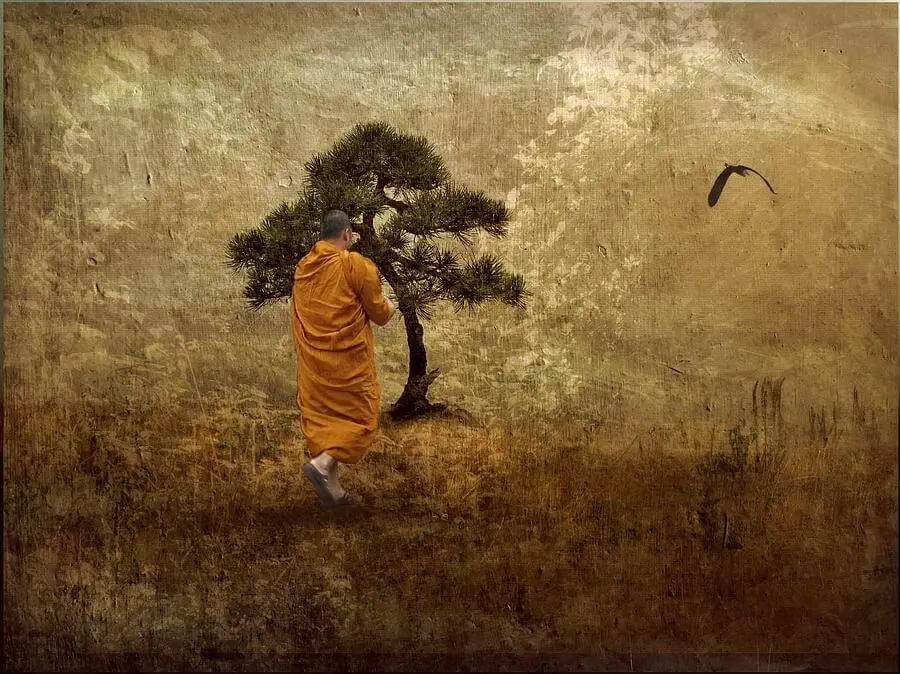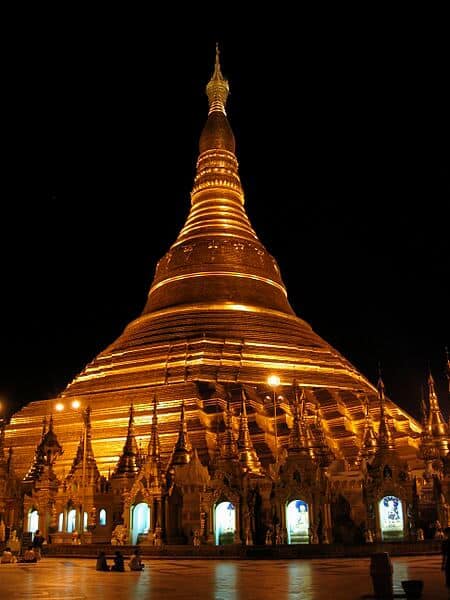Table of Contents
*This post may contain affiliate links. As an Amazon Associate we earn from qualifying purchases.
Leonardo da Vinci once said that there is no greater mastery to have than the mastery of oneself and Vipassana is just that: the exquisite journey that one takes from the overwhelming distractions of everyday life to the surprising world that is one’s own mind. Of course, most of us know what meditation is. In a broad sense at least. But Vipassana is different. Unlike other forms of meditation, Vipassana (or insight meditation) requires you to engage in silent meditation for extremely long periods of time.
Vipassana represents one of India’s most ancient meditation techniques and has been practiced there for more than 2500 years as a remedy for universal ills and its technique is taught by undergoing a 10-day-long course during which participants engage in meditation and abstain from speaking, reading, writing, listening to music or exercising (beyond slow walking).

These ten-day residential courses (also known as a vipassana retreat) are free opportunities for people who have never experienced Vipassana to also benefit. Due to kind benefactors (people who have already completed Vipassana and are experienced with the technique) willing to make donations, not even the cost of food and accommodation is required. And with numerous locations all across the globe (10 in North America, 3 in Latin America, 8 in Europe, 7 in Australia and New Zealand, 1 in the Middle East and 1 in Africa), it’s only a matter of choice and courage to embark on a journey of self-discovery and meditation.
What to Expect from a Vipassana Meditation Retreat
Many could be fooled into thinking that a vipassana meditation retreat is nothing more than prison camp: where participants are forbidden from socializing, reading or engaging in other activities aside from meditation, however, vipassana is considered by experienced practitioners to be an essential spiritual practice. In fact, prolonged silent meditation retreats are viewed by many as the key to dealing with everyday suffering and finding a deep sense of joy.
Even so, there are unquestionable benefits for anyone brave enough to give vipassana mediation a chance. For those who have never engaged in silent meditation, a 10-day vipassana retreat may seem hard, but don’t fear: you may very well discover that your fears were completely unfounded.
Here are some things to look forward to from a vipassana retreat:
- The awareness of the present moment: everyday life has become distracting, regardless of whether we accept that or not. Cellphones buzzing, emails arriving in our inbox, lives that are lived on a “fast forward setting”. It’s no wonder that we feel overwhelmed at times. But the mind and the body react surprisingly when all these distractions are eliminated. It will be hard at first and you will be unaccustomed to the pressing sense of silence surrounding you, however, your mind will slow down and you will discover that you’re noticing certain details about the world that you had previously never noticed. The intricacies of a simple leaf, the beautiful blue hues of the horizon and the distinct sound of every rustle of wind.
- Mindfulness: Very few of us are actually present in the moment. We eat on the run, rarely enjoying a meal without distractions, we perform day-to-day tasks in a robotic-like fashion. But vipassana meditation will offer you the unique opportunity to experience every delicious component of an experience, even that of enjoying your mea as if it were the highlight of a day.
- Experience the pain: Both physical and psychological pain should be experienced. But in today’s society, we often choose to ignore or deny it rather than deal with it. The Buddha speaks of three truths of existence, one of them being impermanence. This principle applies where pain is concerned. Instead of immediately relieving an itch or a pain in your knee, vipassana practicioners will acknowledge the pain and notice that it passes. During your silent meditation retreat, you will notice that you experience different emotions, from joy and thankfulness to fear, sorrow, and even anger. Even so, each one of these emotions will pass, as does the physical suffering. Once having learned that such pain cannot own you, it is in your control to decide how pain should be managed.
- Discover gratitude: You’ll notice that silencing distractions will lead to a never-before-experienced feeling of gratitude. Depending on where your retreat will be held, you will notice that you’ll fall in love with the landscape, the mountains, the trees surrounding the retreat. You’ll appreciate the craftsmanship or the divine creative talent that must have gone into the leaves, the flowers, the grass, the dew drops in the morning. This awareness will feed your sense of gratitude.
- Find a suitable alternative to unhealthy habits: For most of us, the idea of spending 5 to 10 days in complete silence, with no distractions, is downright terrifying. The first idea that springs to mind is boredom: what will we do with ourselves for so long? Curiously, though, you will not get bored. The human mind is uniquely capable of counteracting boredom with curiosity. Once all distractions have stopped, you may find yourself experiencing powerful and creative fantasies about future projects, books or endeavors. More importantly, this ability of silencing the outer world can be borrowed and brought with you back from the retreat, where you can use it constructively, to avoid dangerous distractions such as cigarettes, alcohol and other drugs.
- Bliss (or the much-praised meditation natural high): Experienced teachers will warn you that meditation should not be performed for the sole purpose of achieving that all-absorbing feeling of bliss that so many advocate. Indeed, chances are that during your 10-day retreat, you will achieve that natural high that feels as though you are drunk with bliss. Once you have achieved it, observe that feeling from a neutral standpoint: while this moment shall also pass, it’s particularly enjoyable to experience.
- Find Clarity: A vipassana meditation retreat also provides the unique opportunity of getting clarity on your own life. Of course, when living life at 100 miles per hour, it’s easy to become overwhelmed with uncertainty and anxiety. It’s easy to think that your life is happening to you. But silent meditation will lift the veil from what will have been a hazy representation of your life and show you that things that happen are just that: things that happen. During all that you experience, you are constantly changing, so rather than fear life, accept and love it as it comes. Of course, different people may experience different things: some may judge themselves during retreats, others may learn to forgive (themselves and others).
Experiencing a Vipassana Retreat

Due to the unique manner in which vipassana retreats are organized, virtually any person willing to undergo such an experience will be able to do so. Courses around the world are run on a donation basis, meaning that participants aren’t required to pay for the course, the accommodation or the food. Teachers and assistant teachers also donate their time, as do retreat organizers and others involved.
There are multiple resources to help you plan a vipassana retreat. There is an alphabetical location list to help you identify the retreat closest to you. Nevertheless, once you have experienced the benefits of Vipassana meditation, be sure to also visit the Global Vipassana Pagoda, a wondrous construction in Mumbai that honors Gotama the Budda and expresses gratitude for the preservation of vipassana meditation. The construction is capable of housing 8,000 people in meditation and represents a monument of peace and harmony.
